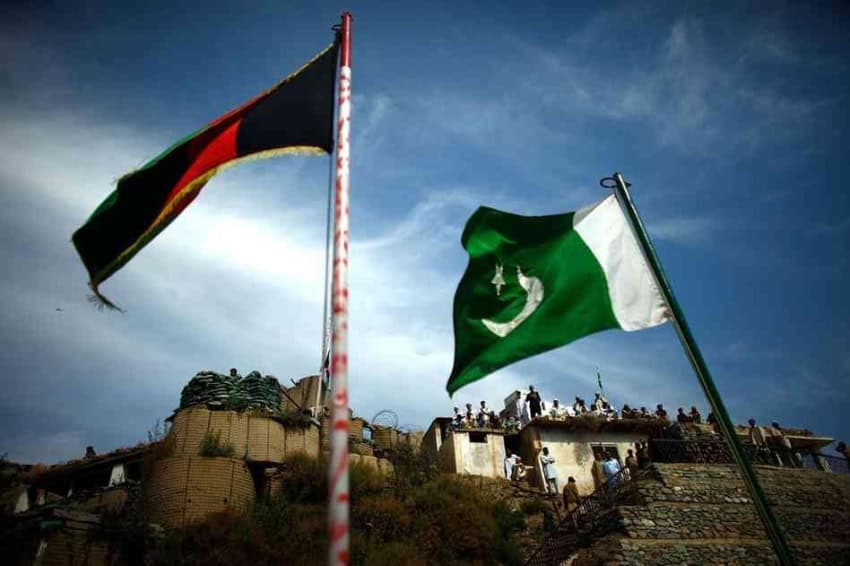No, Not all out war, yet, but war nonetheless. The proxy war and the war of rhetoric. Pakistan and Afghanistan are among the very few countries that hate each other while sharing the same religion, both being Islamic republics and big chunks of their respective populations sharing the same heritage, Yet we couldn’t be further apart. Like other countries, what we share doesn’t unite but actually divides us.
The Problem
For most Af-Pak commentators, the history and the problems or interference start at 1979 and they consider Mujahideen and afghan Taliban the problem. But Afghan Taliban aren’t the problem or even the Pakistani Taliban, or Daud Khan’s Invasion Of Bajaur In 1960-61, or his support for racial militants in Pakistan in the 1970s or Bhutto’s support for Massoud and Haqqani or Zia’s Support for mujahideen. None of them are problems for they all are PRODUCTS of the same problem, which is the day of July 26, 1949, when the Afghan Loya Jirga unrecognised the Durand line and unilaterally declared Durand line agreement void.
Afghan Viewpoints & Legitimacy of Durand Line
There are many arguments Afghanistan and its leaders have made but some of them have been the centrepiece or their narrative.
The biggest argument the Afghan side made is that “The agreement had a 100-year expiry date” This claim is totally false. The expiry date myth has its roots in ‘Second Convention of Peking’ of 1898 Between Qing dynasty of China & UK, where a 99 years clause was written in the agreement, There is no mention of any time frame in the Durand line agreement. There is also a contradiction in this narrative and Afghan government actions. If the agreement was to expire after 100 years, in 1993, why declare it void in 1949?
Afghanistan answer to this question is that “The Agreement was between Afghanistan & British India (British raj), not Pakistan, and with the end of British Raj, Afghanistan declared it void” This argument is technically incorrect. Afghanistan declared it void TWO YEARS AFTER the end of British Raj and formation of a Pakistani successor state which inherited the Durand Line agreement and Vienna Convention on Succession of States in Respect of Treaties (VCSSRT) backs the Pakistani argument on the inheritance of the agreement.
One argument Afghanistan makes is that “It was signed by Amir Abdur Rahman Khan under duress, without consulting his government” But considering that the successive Afghan regimes ratified the agreement in 1905, 1919 & 1921, the “duress” narrative falls apart.
The third argument that Afghan politicians make is that “The border divides the Pashtun population in two.” But this argument is a two-edged sword, their own purpose Indus river border would also divide Pashtuns in two. Today there are more Pashtuns in Karachi than in Peshawar, let alone Kabul. Many others live in Rawalpindi, Lahore or like me, in Islamabad.
Another argument includes equating Durand line with Line of control (LoC) in Kashmir. This is the most absurd as both are worlds apart in reality. No one, neither India or Pakistan consider it a permanent border. It is disputed territory according to UN. Durand line on other hand is literally considered international border by everyone except Afghanistan.
And The last major argument made is that “Pashtun land on Pakistan’s side of Durand Line belongs to Afghanistan or Pashtuns should be reunited as Pashtunistan under Afghanistan, due to similar language and customs.” There is no legal basis for this claim, otherwise, half the world will be claiming the other half & vice versa. But if the argument is even considered, logically the smaller Pashtun body should join the larger one & consider there are twice as many Pashtuns in Pakistan, this argument will only backfire on Afghanistan.
Pashtunistan is a dead horse. Even the staunch Pashtun nationalists, like ANP, don’t call for secession.
The Products of Loya Jirga rejection of Durand Line Agreement
Its only natural for a state to follow the policies its government has prescribed for it. And thus we saw Afghan army under Prime Minister Daud Khan unsuccessfully invading Bajaur twice in 1960-61. Then came 1971, when we saw President Daud Khan hosting and arming, Mukti Bahini styled, Anti-Pakistan militants of BPLF and politicians like Ajmal Khattak in 1973. National Awami Party leaders were paid in Afghanistan by India for ‘Pashtunistan‘. This is confirmed by Jumma Khan Sufi, a close aide of Ajmal Khattak, in his book ‘Faraib e Natamam’. These policies also continued after communist Saur revolution.
But before Saur, naturally, came Pakistan’s first response after 26 years in 1975, Bhutto responded to Daud Khan with Ahmad Shah Massoud, Hekmatyar & Jalaluddin Haqqani. They failed in the 70s but were much more successful under Zia in 80s. Post-1979 history is well discussed and we all know how this tit for tat has been going on since then.
The Only Available Antidote
What’s the Solution? Peace Talks between Afghanistan and Pakistan like Ashraf Ghani suggested? No. The only reason Ghani tried to reach out to Pakistan was because Afghanistan has realised it has lost the asymmetric war with Pakistan (TTP was in full retreat in 2015) like PM Daud realised that he has lost the conventional war with Pakistan in the 1960s & started an asymmetric one. These Peace talks will bear no fruit as they aren’t the antidote.
Afghanistan needs to understand, every action has an equal and opposite reaction. As long as Afghanistan doesn’t recognise the Durand border agreement, its state apparatus will naturally have to keep kicking the dead horse of Pashtunistan and create trouble for Pakistan, and Pakistan will naturally reply in the same tongue.
If Afghanistan can live with their other borders, in which they had no say in, why can’t they abide with the one they once agreed to? If Afghanistan doesn’t reverse the 1949 decision made by Loy Jirga, Af-Pak region is destined for conflict.














